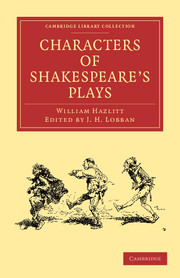Book contents
- Frontmatter
- Preface
- Contents
- Introduction
- Preface
- Cymbeline
- Macbeth
- Julius Cæsar
- Othello
- Timon of Athens
- Coriolanus
- Troilus and Cressida
- Antony and Cleopatra
- Hamlet
- The Tempest
- The Midsummer Night's Dream
- Romeo and Juliet
- Lear
- Richard II
- Henry IV
- Henry V
- Henry VI
- Richard III
- Henry VIII
- King John
- Twelfth Night; or, what you will
- The Two Gentlemen of Verona
- The Merchant of Venice
- The Winter's Tale
- All's Well That Ends Well
- Love's Labour's Lost
- Much Ado About Nothing
- As You Like It
- The Taming of the Shrew
- Measure for Measure
- The Merry Wives of Windsor
- The Comedy of Errors
- Doubtful plays of Shakespear
- Poems and Sonnets
- Notes
Macbeth
Published online by Cambridge University Press: 07 September 2010
- Frontmatter
- Preface
- Contents
- Introduction
- Preface
- Cymbeline
- Macbeth
- Julius Cæsar
- Othello
- Timon of Athens
- Coriolanus
- Troilus and Cressida
- Antony and Cleopatra
- Hamlet
- The Tempest
- The Midsummer Night's Dream
- Romeo and Juliet
- Lear
- Richard II
- Henry IV
- Henry V
- Henry VI
- Richard III
- Henry VIII
- King John
- Twelfth Night; or, what you will
- The Two Gentlemen of Verona
- The Merchant of Venice
- The Winter's Tale
- All's Well That Ends Well
- Love's Labour's Lost
- Much Ado About Nothing
- As You Like It
- The Taming of the Shrew
- Measure for Measure
- The Merry Wives of Windsor
- The Comedy of Errors
- Doubtful plays of Shakespear
- Poems and Sonnets
- Notes
Summary
“The poet's eye in a fine frenzy rolling
Doth glance from heaven to earth, from earth to heaven;
And as imagination bodies forth
The forms of things unknown, the poet's pen
Turns them to shape, and gives to airy nothing
A local habitation and a name.”
Macbeth and Lear, Othello and Hamlet, are usually reckoned Shakespear's four principal tragedies. Lear stands first for the profound intensity of the passion; Macbeth for the wildness of the imagination and the rapidity of the action; Othello for the progressive interest and powerful alternations of feeling; Hamlet for the refined development of thought and sentiment. If the force of genius shewn in each of these works is astonishing, their variety is not less so. They are like different creations of the same mind, not one of which has the slightest reference to the rest. This distinctness and originality is indeed the necessary consequence of truth and nature. Shakespear's genius alone appeared to possess the resources of nature. He is “your only tragedy-maker.” His plays have the force of things upon the mind. What he represents is brought home to the bosom as a part of our experience, implanted in the memory as if we had known the places, persons, and things of which he treats. MACBETH is like a record of a preternatural and tragical event. It has the rugged severity of an old chronicle with all that the imagination of the poet can engraft upon traditional belief.
- Type
- Chapter
- Information
- Characters of Shakespeare's Plays , pp. 21 - 32Publisher: Cambridge University PressPrint publication year: 2009First published in: 1908

